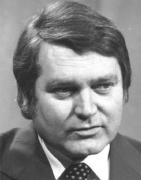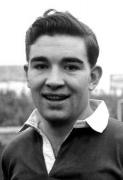|
|
||||||||||||||||||||||||
 |
Featured person
Recently added |
Ivor Mills (1929 - 1996): |
||||||||||||||||||||||

|
| Ivor Mills © Paul R Jackson. |
Ivor Mills was one of the front rank Independent Television News (ITN) presenters in the 1960s and 1970s, and one of the first newscasters to become famous as such. He was also a reporter who interviewed numerous leading world figures, and later a highly successful executive with the Post Office and later British Telecom.
Mills was born in Belfast, and after school attended Stranmillis College and Queen's University, Belfast. His career was heading towards in music, having studied classical composition and musical history, obtaining a Licentiate of the Royal Academy of Music and teaching music in Belfast. But he then changed course, becoming a television and radio journalist and freelance writer. He joined Ulster Television in 1959, its foundation year, and quickly became a popular presenter on such programmes as the flagship local news magazine, Roundabout, which contained amongst other items, interviews and features on local and visiting personalities. On one occasion, the Managing Director decided to invite onto the programme a man whose seemingly perpetual job was painting railings on Stranmillis Embankment, Belfast. The man accepted and was interviewed by Mills, who asked him at one point if his job was boring. The man replied that it was extremely boring, using a notorious four-letter expletive - and it was a live show. The Managing Director feared an angry storm of protest from viewers, but none came, and he would later note that thanks to him and Mills, Ulster Television had featured the first use of this word on British television, years before the generally accredited first use by critic and well-known uise of expletives Kenneth Tynan. Mills moved to Southern TV in 1963, and after two years there, combined with freelance work as writer, editor, producer, and presenter, aslo contributing to the BBC World Service, Network Radio and other ITV stations nationwide.
In 1965, he joined ITN, a longtime ambition, as a reporter and was one of its principal newscasters from 1967 until 1978. He interviewed many leading figures in many walks of life, including Margaret Thatcher; Freddie Laker, the airline entrepreneur; Prime Minister Harold Wilson; actress and cinema idol Sophia Loren; US Senator and later assassination victim Robert Kennedy; the controversial Labour politician George Brown; Dr Barnes Wallis the inventor of the bouncing bomb used to attack German dams during the Second World War in the famous "Dambuster" raids; Sean Connery, another cinema star, and the champion motor-racing driver Graham Hill, the only driver so far to have won the so-called Triple Crown of Motorsport. As a presenter he shared the early evening programmes, mostly with Gordon Honeycombe, and became the main presenter of the weekend programmes until he returned to ITN's "hard news" team in 1972. Some said his easy, relaxed camera style as a convivial and expert interviewer noted for being unflappable was the reason for his removal from being a front man, ITN being suspected of pressing for a more heavyweight style.
In 1978 Mills moved to the Post Office as its first Head of Public Affairs. He kept this rôle when telecommunications was separated from the nationalised Post Office and he elected to serve in what became known, in 1981, as British Telecom being promoted Deputy Director of Corporate Relations. He was thus at the centre of what was to be the biggest act of privatisation the world had seen. He was particularly valuable as a media advisor, whether preparing company officials to deal with attention from Parliament, political parties, academic, CBI and other pressure groups; or training managers in television and radio interview techniques Later, when time pressed more and more on him, he still remained available to coach the appropriate board member or senior manager when a major television interview was imminent; most of the managers involved found the actual interview itself easier than the thorough dress rehearsal with Mills. He was also able to play large roles in broadcasting events, such as working closely with the Queen who was due to open a new cable service linking the United Kingdom to Australia via North America.
He had when at ITN done some reporting from Northern Ireland. Although he had clear Unionist sympathies, his balanced reporting, free of bias and his not hesitating to criticise, angered elements of some of the more extreme on both the Protestant and Catholic sides, and for some years, personal threats to him made him limit his time there.
Privately, Mills was a popular figure, with a sharp sense of humour; a bon viveur, fond of good food and wine, long lunches and tennis afternoons (often with another well-known and popular newscaster, Reginald Bosanquet), and, a cultivated man, was keen on art, the theatre and music. His wife Muriel Hay was an accomplished pianist and sought-after piano teacher - she and Mills, who insisted she was the better player, performed piano on duets on television occasionally in the 1950s - and Mills himself was elected a Member of the Board of Trustees of the Academy of Ancient Music, the "period performance" orchestra based in Cambridge.
After his retirement in 1988 he took on some media consultancy work, but was impeded by his diabetes and by injuries sustained in a hit-and-run accident outside his North London home in 1991.
| Born: | 7 December 1929 |
| Died: | 30 May 1996 |
| Richard Froggatt |
| Acknowledgements: Wesley McCann |


Home | Our Policies | Plaques | Browse | Search | Sponsors | Links | Help | Contact
Privacy & Disclaimer | Cookie Policy | Site Map | Website Design By K-Point
© 2024 Ulster History Circle









